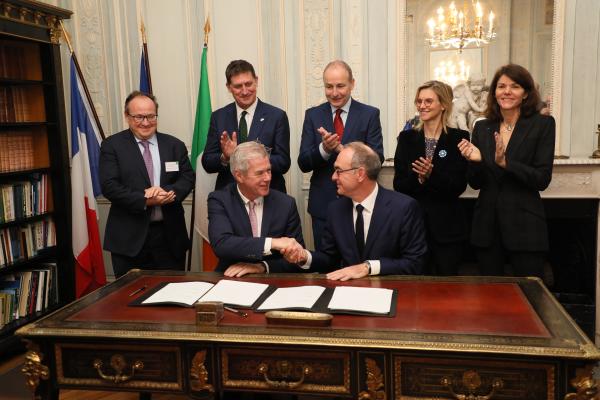
Irish Prime Minister Micheál Martin and France’s Energy Transition Minister Agnès Pannier-Runacher welcome the electricity interconnector agreement between Ireland and France. The total project cost is €1.623 billion. Funding of €800 million was agreed with the European Investment Bank (EIB), Danske Bank, BNP and Barclays, in addition to a grant of €530.7 million under the Connecting Europe Facility (CEF) and €404 million in financing from RTE (Réseau de Transport d’Electricité).
This 700 MW electricity interconnector covering a distance of 575 km will improve the security of energy supply and the exchange of renewable energy between France and Ireland. Its construction will begin in early 2023.
The financing agreements and construction arrangements were signed in Paris.
Irish Prime Minister Micheál Martin, French Minister Agnès Pannier-Runacher and Irish Minister Eamon Ryan met in Paris on 25 November to sign the technical and financial agreements on the Celtic Interconnector.
These agreements were signed in the presence of France’s Energy Transition Minister Agnès Pannier-Runacher, Irish Minister for the Environment and Climate Eamon Ryan, Chairman of the Executive Board of RTE Xavier Piechacyzk, CEO of Irish electricity transmission operator EirGrid Mark Foley, and EIB Vice-President Ambroise Fayolle.
Developed by EirGrid and RTE, the 700 MW high-voltage submarine link will connect Ireland’s south coast to northern France. This will be Ireland’s first interconnector with continental Europe.
Agreements have been signed for both the construction of the cable and for the €800 million financing operation, in which the EIB, Danske Bank, Barclays and BNP are participating.
These agreements enable the project to enter an operational phase, which will begin in 2023.
The cable will run 575 kilometres between the south coast of Ireland and Finistère. It will import and export enough electricity to power 450 000 homes. Commissioning of the project is scheduled for 2026.
The interconnector will link the municipality of La Martyre in Brittany to the town of Knockraha in County Cork in Ireland, which studies have identified as the best locations for grid connection in each country.
The strategic nature of this project was recognised by the European Union, which partially funded it and designated it a project of common interest (PCI). A PCI is an infrastructure project connecting the energy systems of EU states and provides access to financial support via the Connecting Europe Facility (CEF) loan instrument — a fund to develop energy, transport and telecommunications networks in the European Union.
In 2019, RTE and EirGrid received €530.7 million of CEF funding for the project.
Irish Prime Minister Micheál Martin said: “The Celtic Interconnector will help reduce the bills of Irish and French energy consumers, increase the use of renewable energy, improve the security of telecommunications and better integrate EU electricity markets. Today marks an important milestone in Ireland’s cooperation with its EU partners to ensure a low-carbon energy transition.”
France’s Energy Transition Minister Agnès Pannier-Runacher said: “The Celtic Interconnector is a big step forward — it will strengthen the energy partnership between France and Ireland, reflecting our excellent bilateral relations. This interconnector will help secure electricity supply in France and the European Union and accelerate the use of renewable energy across Europe.”
Irish Minister for the Environment, Climate and Communications Eamon Ryan added: “The technical and financing agreements confirmed today for the Celtic Interconnector will enable construction of the submarine cable between east Cork and Brittany, which will connect the Irish and French power grids, improve the security of our electricity supply, help us achieve our climate goals and reduce the cost of electricity.”
Irish Finance Minister and EIB Governor Paschal Donohoe stated: “Enabling large-scale investments in energy transmission is essential to harness the potential of renewable energy, meet climate targets and reduce electricity bills. I welcome the financing and technical agreements signed today, which will enable the Celtic Interconnector to connect Ireland to the European Union’s electricity market, and I wish to applaud the European Investment Bank for supporting this project.”
European Commissioner for Energy Kadri Simson added: “Russia’s use of energy as a weapon has reinforced the need to make the European Union’s energy system more interconnected, reliable and efficient. In 2019, RTE and EirGrid received €530.7 million of CEF funding for this project. The Celtic Interconnector will help improve Ireland’s security of electricity supply and facilitate the development of renewable energy in both Ireland and France. Today, Ireland, France and the European Union as a whole are showing the world how EU solidarity works in the energy sector.”